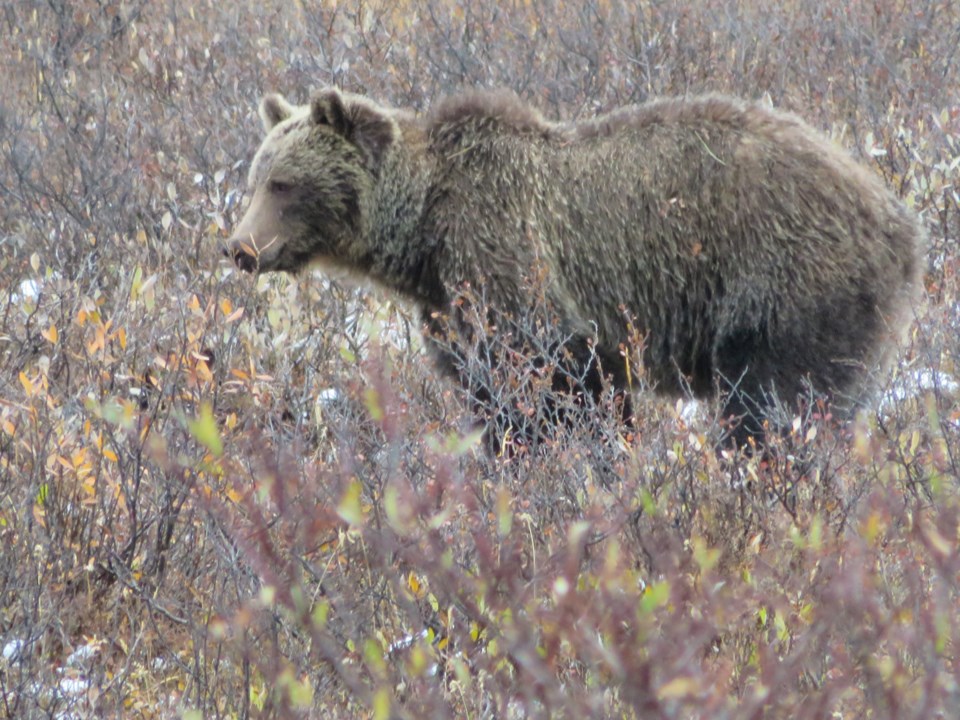BANFF – Skiing in a backcountry area of Banff National Park that is closed to protect a denning female grizzly bear has cost four people $600 each.
The four pleaded guilty in Canmore Provincial Court on March 3 to charges of entering a closed area at the popular ski touring Jimmy Junior-Hidden Bowl region near Bow Summit last November and December.
The area was closed to protect the grizzly bear – a threatened species in Alberta – in hope she would emerge from the den with cubs this year after she was seen with a male several times during breeding season.
Parks Canada officials say the federal Crown requested fines of $1,250, but due to financial circumstances and level of remorse, the four were issued fines of $600 each.
“Keeping wildlife wild is a shared responsibility and we all have a role to play in that,” said Mark Benson, a resource conservation officer for Lake Louise, Yoho and Kootenay.
“Our primary focus is to keep wildlife and people safe in this situation – that’s why we have the closure in place.”
On Nov. 4, 2020, Parks Canada closed this accessible ski touring destination located on the eastern slopes of Mount Jimmy Simpson. This female grizzly is not tagged or collared, but is known to Parks Canada.
The closure was put in place to avoid any noise or disturbance near her den that may cause her to miscarry, or lose newborn cubs, if she was indeed successfully bred.
Bred females experience delayed implantation; the embryo does not implant in the uterus until November or December, but only if the bear has enough fat reserves to sustain her and the developing fetuses through hibernation.
Cubs are born in the den in late January to early February and weigh about half a kilogram. While the female dozes for another several months, the cubs nurse on milk rich in fat.
There have been occasions when bears have abandoned their dens due to human activity.
Benson said this is a critical time for bears.
“When they are metabolically trying to make it though the winter, if they’re disturbed, it could have negative consequences on their overall health,” he said.
This particular female grizzly was observed with a large male grizzly in June and July last year.
“We did see evidence that she had exhibited mating behaviour with a male during breeding season, but it remains to be seen if she will emerge with cubs,” Benson said.
This is the second winter season that the closure has been in place. In April 2019, a group of backcountry skiers spotted a grizzly bear inside a den. It’s believed to be the same bear again this winter.
Bow Valley Naturalists is pleased to see Parks Canada law enforcement wardens are enforcing these closures.
“With the day accessible backcountry seeing ever increasing numbers of outdoor enthusiasts, spot closures and seasonal restrictions for ecological reasons are going to be part of everyone’s future," said Reg Bunyan, the group's vice-president.
Bunyan, however, said the biggest challenge, whether it be grizzly denning closures, wildlife corridor restrictions or feeding wildlife, all the enforcement and education in the world is for naught if park users “don’t care”, or feel it “doesn’t apply to me”.
"Ultimately, the only way these management restrictions and closures can function is with broad user acceptance and compliance," he said.
Meanwhile, if this female grizzly bear has been successfully bred and emerges with cubs in spring, it will be her second litter.
In 2019, she had two cubs; however, she lost both to what is believed to be natural causes. Natural mortality is highest for young-of-year cubs and is usually related to nutrition. Larger, adult male bears also sometimes kill younger bears.
Parks Canada plans to keep this closure in place until further notice.
Benson said females with cubs typically emerge from dens later than males or females without cubs.
“Sometimes females with cubs might not emerge until late April or early May; it just depends on multiple variables,” Benson said.
“We have no indication that she is up and about yet.”
Parks Canada estimates that there are approximately 60 to 80 grizzly bears with overlapping home ranges, including parts of Banff National Park.
Grizzly bears are a threatened species in Alberta.
Benson said reproductive-aged female grizzly bears are critical to the long-term survival of the grizzly bear population in the mountain national parks.
“It’s very important that we do whatever we can for all grizzly bears, but particularly reproductive-age female grizzlies who may have cubs in the den,” he said.
“We want to ensure that we’re doing whatever we can to protect these animals.”
The closed area is barricaded and roped off at likely access points, where signage is also set up, including maps of the closed area. There is also information on Parks Canada's website.
Benson said Parks Canada also does regular patrols to make sure the signs are clear of snow.
“We want to make sure people don’t inadvertently pass the signs without realizing that they’re there,” he said.



